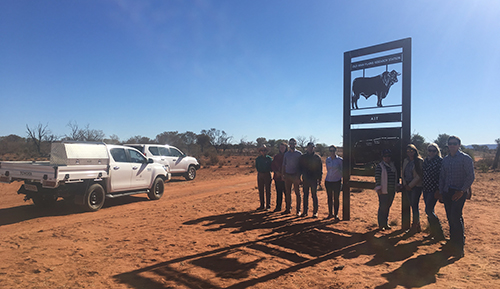Alice Springs Pastoral Industry Advisory Committee modelling workshop for the OptigGraze project
Above: ASPIAC members and some guest speakers from a previous meeting.
November saw the third meeting and final meeting for the Alice Springs Pastoral Industry Advisory Committee (ASPIAC) in 2020. In addition to the standard agenda items for the committee’s roles, such as guiding research to assist the industry, the Committee also hosted Rebecca Mohr-Bell from Mathison Station to talk about the two year OptiGraze project.
The meeting at the Arid Zone Research Institute was attended by ASPIAC members Andy Hayes, Sarah Cook, Nicole Hayes, James Christian, and Alistair Bayley, plus Sheri Fogarty who attended via Skype. The ASPIAC also welcomed Nick Krebs from Ambalindum Station as a potential new member.
The OptiGraze project is assessing the commercial benefits of grazing strategies being trialled in the Quality Graze project on the Department’s Old Man Plains Research Station (OMP), funded by a Landcare Smart Farms Grant. The project is being run by Rebecca Mohr-Bell from Argyll Consulting and Chris Materne who leads the Quality Graze Project.
The grazing strategies at OMP have produced good quality beef, even in low rainfall years, while maintaining or improving land condition and therefore improving the basis for future production. ASPIAC members were very willing to be a part of rigorous testing of the financial side. After explaining the project, Rebecca led a workshop to identify representative production practices, including herd structure, and production expenses for Central Australia, to enable the comparison of Quality Graze grazing systems with those of a hypothetical Central Australian property.
ASPIAC members enthusiastically identified local industry standards for parameters required for the Breedcow herd performance model. The Breedcow model will be linked to the Dynama modelling software to test herd performance over a 10 year period. The required information included rainfall, calving rates and times, pregnancy testing approaches, mustering schedule, bull management, paddock options, vaccinations, supplements and much more.
The four hour workshop stimulated great discussions and ASPIAC members were invited to be further involved in the project in 2021, by participating in actual case studies such as modelling performance of their own herds using the Breedcow and Dynama programs.
ASPIAC also discussed funding opportunities that could lead to new projects in 2021 . Northern Breeding Business (NB2) is a developing Meat Livestock Australia (MLA) project that is set to be a big focus of extension and research in coming years. There was also a suggestion from members that it’s time for another Pastoral Industry Survey to capture the industry changes over the past decade.
Contact
Meg Humphrys
Pastoral Extension Officer
08 8951 8144

